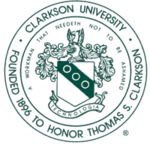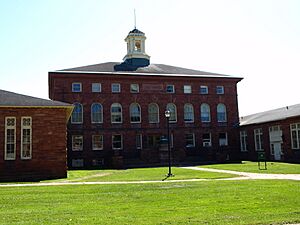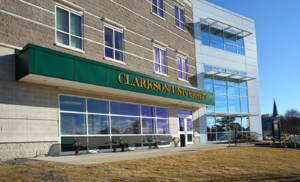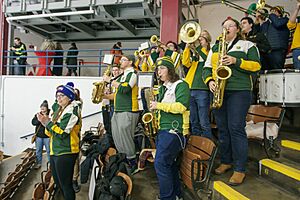Clarkson University facts for kids

Seal of Clarkson University
|
|
|
Former names
|
Thomas S. Clarkson Memorial School of Technology (1896–1913) Thomas S. Clarkson Memorial College of Technology (1913–1984) |
|---|---|
| Motto | A Workman That Needeth Not to be Ashamed |
| Type | Private research university |
| Established | 1896 |
| Accreditation | MSCHE |
|
Academic affiliations
|
Space-grant |
| Endowment | $216.6 million (2022) |
| President | Marc P. Christensen |
|
Academic staff
|
750 |
| Students | 4,600 |
| Location |
,
,
U.S.
44°39′50″N 74°59′53″W / 44.664°N 74.998°W |
| Campus | Village, 640 acres (2.6 km2) |
| Other campuses | |
| Colors | Green & gold |
| Nickname | Golden Knights |
|
Sporting affiliations
|
20 varsity teams NCAA Division I – ECAC Hockey (women's & men's) NCAA Division III – Liberty League |
| Mascot | The Golden Knight |
 |
|
Clarkson University is a private research university with its main campus in Potsdam, New York. Clarkson has additional graduate program and research facilities in the New York Capital District and Beacon, New York. It was founded in 1896 and has an enrollment of about 4,600 students studying toward bachelor's, master's, and doctoral degrees in each of its schools or institutes: the Institute for a Sustainable Environment, the School of Arts & Sciences, the David D. Reh School of Business, the Wallace H. Coulter School of Engineering, and the Earl R. and Barbara D. Lewis School of Health Sciences. The university is classified as an R2 research institution.
Contents
History
The school was founded in 1896, funded by the sisters of Thomas S. Clarkson, a local entrepreneur who was accidentally killed while working in his sandstone quarry not far from Potsdam. When a worker was in danger of being crushed by a loose pump, Clarkson pushed him out of the way risking his own life. Clarkson was crushed against a wall by the swinging pump, sustaining severe internal injuries. He died five days later. The Clarkson family realized great wealth in the development of such quarries, and Potsdam sandstone was highly sought after by developers of townhouses in New York City and elsewhere. The family were important benefactors in the Potsdam area. The school was called the Thomas S. Clarkson Memorial School of Technology.
In 1913, the name was changed to Thomas S. Clarkson Memorial College of Technology, which was used in a shortened version as Clarkson College of Technology or CCT. During the first half of the 20th century the majority of the campus was located "downtown". The campus slowly expanded to an area known as the "Hill", located on the south-western edge of Potsdam village. As of 2001, almost all academics and housing had moved to the hill campus, although the university still uses the downtown buildings known as Old Snell and Old Main for administrative functions. In 2022, the Clarkson board of trustees named the hill campus "The Collins Hill Campus" in honor of longtime President Tony Collins.
On February 24, 1984, the school officially became Clarkson University, although the pep band's rallying cry at hockey games is still "Let's Go Tech!". The school and its hockey team have carried the nickname "Tech" since the 1896 founding. "CCT" is still printed on older school property and equipment.
On February 1, 2016, Union Graduate College merged into Clarkson University and became the Clarkson University Capital Region Campus in Schenectady, New York.
Academics
More than 50 undergraduate majors and minors are available at the university. The university also offers master's and doctoral degrees. These degree programs are offered through the School of Arts & Sciences, David D. Reh School of Business, Institute for a Sustainable Environment, Wallace H. Coulter School of Engineering, the Earl R. and Barbara D. Lewis School of Health Sciences and the Clarkson School.
Clarkson University is home to the Center for Advanced Materials Processing (CAMP). CAMP is dedicated to developing Clarkson's research and educational programs in high-technology materials processing. It focuses on developing innovations in advanced materials processing and transferring this technology to business and industry. The center receives support from the New York State Office of Science, Technology, and Academic Research for research and operating expenses as one of 14 Centers for Advanced Technology (CATs). In addition, CAMP-related work receives several million dollars each year from the federal government and private industry.
Clarkson's 15 Student Projects for Engineering Experience and Design (SPEED) teams allow students across all majors to participate in hands-on, extracurricular projects.
Clarkson participates in student exchange programs with schools in Europe and Australia.
Rankings
U.S. News & World Report's 2019 rankings "America's Best Colleges" placed Clarkson University in the top 125 institutions in the nation, and a listing on the "Great Schools, Great Prices" list. Clarkson's supply chain management program was listed as one of the top 20 in the nation. The survey editors also placed Clarkson in the "A+ Options for B Students" list and on the "Best Colleges for Veterans" list in the National University category.
| THES World | 801–1000 |
|---|---|
| USNWR National University | 127 |
| Washington Monthly National University | 79 |
| Forbes | 309 |
Clarkson University's Entrepreneurship Program is one of the top 15 in the nation, according to the Princeton Review's 2015 rankings. and Entrepreneur magazine's 2015 rankings. Clarkson University ranked #8 among "Top Salary-Boosting Colleges" nationwide in Money's 2015 rankings.
Clarkson's online graduate business programs #12 in the nation (U.S. News & World Report 2013).
Clarkson is #20 on the Fifty Most Affordable with a Return on Investment list, Bloomberg Businessweek, 2011.
Clarkson is ranked among the nation's most environmentally responsible colleges, by Princeton Review Guide to Green Colleges: 2019 edition.
U.S. News & World Report's Best Graduate Schools 2019 ranks Clarkson 40th overall in Environmental Engineering.
The Clarkson School
The Clarkson School, a special division of Clarkson University, was founded in 1978. The School offers students an early entrance opportunity into college, replacing the typical senior year of high school with a year of college. It is one of few college early admission programs in the country that provides a real community living/learning experience on a university campus.
The Clarkson School's Bridging Year is a "bridging year" between high school and college for students who are ready to enter college early. Every year, 50 to 80 high school students are accepted to The Clarkson School, where they may work towards a GED and take college classes. They may also work with their high schools to complete a high school diploma or drop out of high school entirely. After they complete the program, they are given the option to enter Clarkson University with all credits from the previous year or to transfer to another school, usually as freshmen with advanced standing.
Students in The Clarkson School are fully matriculated undergraduates with freshman status at the university. They take classes with other University students and usually carry a course load of 15 to 18 credits per semester for two semesters. College credits may also be given for college and Advanced Placement courses taken before entering The Clarkson School. Cross-registration at neighboring area colleges and universities can provide additional college credits, particularly in art, music and languages. These credits also appear on an official Clarkson University transcript.
The Clarkson School students are housed in Newell House and Ormsby House in Price Hall and the typical class size is about 50 students. Students participating in this program are often called "Schoolies" by other Clarkson students.
Campus
Clarkson has two campuses in Potsdam—the "downtown" campus and the Collins Hill Campus—as well as the Capital Region Campus in Schenectady, New York, and the Beacon Institute for Rivers and Estuaries in Beacon, New York.
The health science departments of Occupational Therapy, Physical Therapy and Physician Assistant Studies are located on the downtown campus. The campus bookstore is located in downtown Potsdam. The last student dormitory (Congdon) located on the downtown campus closed in May 2006. The only buildings remaining in Clarkson's service at the downtown campus are a few administration buildings, the Army ROTC house, the Clarkson Hall Center for Health Sciences (physical therapy and physician assistant studies), and the Peyton Hall Business Incubator. Other downtown campus buildings contain leased space to businesses.
Athletics
Clarkson's athletic teams are known collectively as the Golden Knights. There are 20 varsity athletic teams. Except for the men's and women's alpine and nordic skiing, all of these teams compete in the NCAA.
While Clarkson is an NCAA Division III school, both the men's and women's ice hockey teams compete in Division I, with both teams playing in the ECAC. The men's team is a traditional power in the ECAC. They have won 6 ECAC Tournament Championships, most recently in 2019. Clarkson's most recent NCAA tournament was as the number two seed in the 2019 NCAA Northeast Regional, where they lost in overtime to the University of Notre Dame, 3–2, in the 1st round.
The women's team has appeared in every tournament since entering the ECAC in 2004 and have appeared in four NCAA tournaments, winning the 2018 edition, 2017 edition, and 2014 edition, the first three NCAA titles won by the school, the first NCAA ice hockey title won by a school in St. Lawrence County, and the first Division I NCAA championship won by a school from the North Country.
Other Division III varsity teams compete in the Liberty League conference and include baseball, men's and women's basketball, men's and women's cross country, men's golf, men's and women's lacrosse, men's and women's soccer, softball, men's and women's swimming, and women's volleyball.
The men and women's alpine skiing and nordic skiing teams compete in the MacConnell Division of the Eastern Collegiate Ski Conference (ECSC), within the United States Collegiate Ski and Snowboard Association (USCSA). They are top contenders almost every year within their division and even conference, and have consistently qualified for the annual USCSA National Championships numerous times. In 2019, the Women's Nordic Team were USCSA National Champions and the Men placed second.
Other non-varsity clubs include men's and women's ice hockey, men's lacrosse, men's and women's rugby union, men's soccer, men's bowling, combined men's and women's crew, and ultimate frisbee. Clarkson's combined men's and women's club racquetball team won the Division II title at the USRA National Tournament in 2005. In 2010, the school started a club football team.
"The Golden Knight" is the university's hockey mascot, which can be seen at hockey games waving the Clarkson flag. The nickname "Golden Knights" was first suggested in an editorial of the October 28, 1950 issue of the Clarkson Integrator, and was in use by the following month.
Clubs
Clarkson University's Student Association (CUSA) sponsors more than 130 clubs and organizations, the largest of which being the Outing Club, Ski Club, Cornhole Club, the Clarkson Pep Band, and the Clarkson Union Board. All CUSA sponsored clubs are entirely student-run and both undergraduate and graduate students are welcome to join.
Clarkson Union Board (CUB) is the campus's programming board. CUB hosts various campus events throughout the semester and co-sponsors events with other organizations and University offices and departments. CUB provides professional quality audio and visual support for on-campus events, and hosts the annual SpringFest/FallFest concerts. Previous performers have included Yung Gravy, bbno$, Panic! at the Disco, Jay Sean, and The All-American Rejects.
K2CC
Amateur Radio Club (K2CC), established in 1922 is the university's oldest organization that is still active today. The club offers two licensing exam sessions per semester and interacts regularly with the local community. K2CC has both analog and digital voice repeaters and maintains a contest and experimentation room equipped with DX, weak signal and satellite radios and antennas.
WTSC
With WTSC 91.1 FM The Source, Clarkson also offers one of the North Country's most popular radio stations, which is run completely by the student body. Students can broadcast their own shows and offers a wide variety of music from Rap to Alternative, from Classic rock to street punk. The station has well over 1,000 CDs and nearly 24 Terabytes of music from vinyl. The station has a fully equipped broadcast studio (studio A), as well as a second studio for mixing (studio B), and a fully functional recording studio.
Golden Knotes
Clarkson Golden Knotes is the Co-ed a Cappella group on campus that formed in the Spring of 2002. Every semester a Final Performance is held to showcase the songs the group worked on for that semester. They also perform at various events on campus. Each year, executive board members of the Golden Knotes hire music students from the neighboring Crane School of Music to serve as music director of the group.
FIRST Robotics
Clarkson Robotics brings Clarkson University students together with local high school students to design, build, and test a robot that competes in the FIRST Robotics Competition each year.
Applied Computer Science Labs
Applied CS Labs - The Applied Computer Science Labs at Clarkson University consists of the Clarkson Open Source Institute, the Internet Teaching Lab, and the Virtual Reality Lab, however only the first two are populated. These labs, collectively referred to on campus as COSI, are almost entirely student-run, offering the opportunity to gain experience in managing both facilities and projects. All three labs are located on the 3rd floor of the Science Center in rooms SC334 and SC336. The Applied CS Labs are home to Clarkson University's open source mirror, which serves downloads for popular projects like Blender (software) and the Ubuntu operating system, among many others.
Clarkson Pep Band
The Clarkson University Pep Band is a student-run organization that supports the Clarkson University Golden Knights ice hockey teams. The band consists of approximately 75 full-time members, and performs at Clarkson's Cheel Arena at all of the home games for the Men's NCAA Division I hockey team and some games for the NCAA Division I Women's team.
The band also travels to Clarkson Men's ECAC Hockey conference away games with 35-40 members (unless restricted by the policies of the opposing team's arena) and post-season tournaments.
The Clarkson University Pep Band was founded in the fall of 1964, by a small group of Clarkson students.
Clarkson Theatre Company
The Clarkson Theatre Company (CTC) is a student-run theatre group, part of Clarkson University and supported by the Clarkson University Student Association (CUSA). The mission of CTC is to provide both theatrical entertainment and an outlet for artistic self-expression in the realm of the theatre arts at Clarkson. Membership consists of students and faculty from Clarkson and the other Associated Colleges of the St. Lawrence Valley (SUNY Potsdam, SUNY Canton, and St. Lawrence University)
Every fall, CTC puts on a musical over Clarkson University's family weekend, sometime in mid-to-late October. The production time for this show is between 5 and 7 weeks. After the fall production is over, preparations for the One Act Festival begin. This festival is made up of short plays chosen and directed by students, as well as several written by students. This festival is usually put on as a fundraiser for a charity chosen by the executive board, and takes place at the end of January or beginning of February. The next show, usually a straight play, is put on near the beginning of April. Show choice for each slot is not limited to either a musical or play, but it is traditional to use this structure; as shows are chosen by a general member vote, however, any show can be chosen to be put on any semester.
Wes Craven, creator of the A Nightmare on Elm Street franchise, was a professor at Clarkson University in 1968, as well as faculty adviser to the Clarkson Drama Club (the predecessor of the current Clarkson Theatre Company). As part of one of Professor Craven's classes, Humanities IV, several Theta Chi members wanted to make a spoof of traditional horror movies, about the strange occurrences in their fraternity's house at 18 Elm Street. The filming included CTC's home, Old Snell Hall, where the boiler room scene took place in the basement. While none of those involved had very much film experience, they made the film for about $300 and it was shown twice on campus. Much of Craven's inspiration for A Nightmare on Elm Street came from this first filmmaking experience; the house in the movie, while not the house used in the first version, resembles this house and also resides on Elm Street.
Fraternities and sororities
Clarkson social fraternities began organizing on campus in 1903. Several local organizations accepted members from both Clarkson and SUNY Potsdam. In 1977, the first Clarkson-only sorority was founded, and in 1987, Clarkson discontinued recognition of the local sororities at SUNY Potsdam. Clarkson women were still allowed to join these organizations but they could not participate in on-campus rush or live in their houses prior to other off-campus options. Over the years, there have been many different fraternities and sororities that have come and gone due to declining membership, university probationary periods, and disaffiliation from nationals. In order for the university to recognize a Greek organization, all the members must be registered Clarkson students. Additionally, any new organization applying for recognition after 1977 must affiliate with a national organization within five years to maintain recognition. Clarkson recognized international and national fraternities are Alpha Chi Rho, Delta Upsilon, Phi Kappa Sigma, Sigma Chi, Sigma Phi Epsilon, Tau Epsilon Phi and Tau Kappa Epsilon; there remains only one recognized local fraternity, Zeta Nu. Clarkson recognized international and national sororities are Delta Zeta, Phi Sigma Sigma, Theta Phi Alpha, and Kappa Delta Chi. Additionally, there are a number of professional Greek-lettered organizations: Alpha Kappa Psi, Chi Epsilon, Omega Chi Epsilon, Phi Delta Epsilon, Phi Kappa Phi, Tau Beta Pi, and Tri-Beta. Clarkson is home to a chapter of the national service fraternity Alpha Phi Omega. Clarkson also has several local fraternities that are not recognized by the school including Beta Tau, Omicron Pi Omicron, and Tau Delta Kappa.
Interfraternity Council
The Interfraternity Council (IFC) provides outlets for social interaction among the fraternity and sorority members. IFC helps to sponsor educational opportunities for all of its members and to help to promote the fraternal ideals of leadership, scholarship, service, community, and brotherhood.
Panhellenic Council
The Panhellenic Council is the governing body of the sorority system. The Panhellenic Council provides many opportunities for involvement in campus life and the fraternity and sorority system outside of the individual sororities. Recruitment, social, and educational opportunities are provided by the council. All social sororities recognized by Clarkson University adhere to the rules and regulations set by the National Panhellenic Conference.
Greek Life
Fraternities and sororities attend each other's national philanthropy and local community service events. Greek Week and Ice Carnival have an extensive history both with the local colleges and the Potsdam community.
Publications and media
- The Integrator is a weekly student-run newspaper that is distributed on Clarkson's campus as well as the town of Potsdam.
- WCKN Television is a student-run television station and is also the local cable system's public access station. In-house programming includes hockey games, news, talk shows, comedy shows, game shows, and various other Clarkson sporting events.
- WTSC Clarkson Radio is a student-run radio station that gives students the opportunity to produce their own weekly radio programs, and consequently serve the community by offering entertainment, news and weather, and special programming via the radio.
- The Clarksonian is a student-run yearbook publication group.
ROTC
Clarkson University is a host university for both the Army ROTC and Air Force ROTC. ROTC has been an institution at Clarkson since May 1936, when the first ROTC Battalion was activated during the tenure of College President James S. Thomas. The ROTC program at Clarkson has commissioned well over 1,150 military officers. These alumni have been represented at each level of the Officer Corps, from Second Lieutenant to General.
Army ROTC
The Clarkson Army ROTC Battalion (officially the "Golden Knight Battalion") is one of 272 Army ROTC battalions in the United States. The average size of the Golden Knight Battalion is 100 Cadets, mostly Clarkson students.
Notable alumni
See also
- Association of Independent Technological Universities




